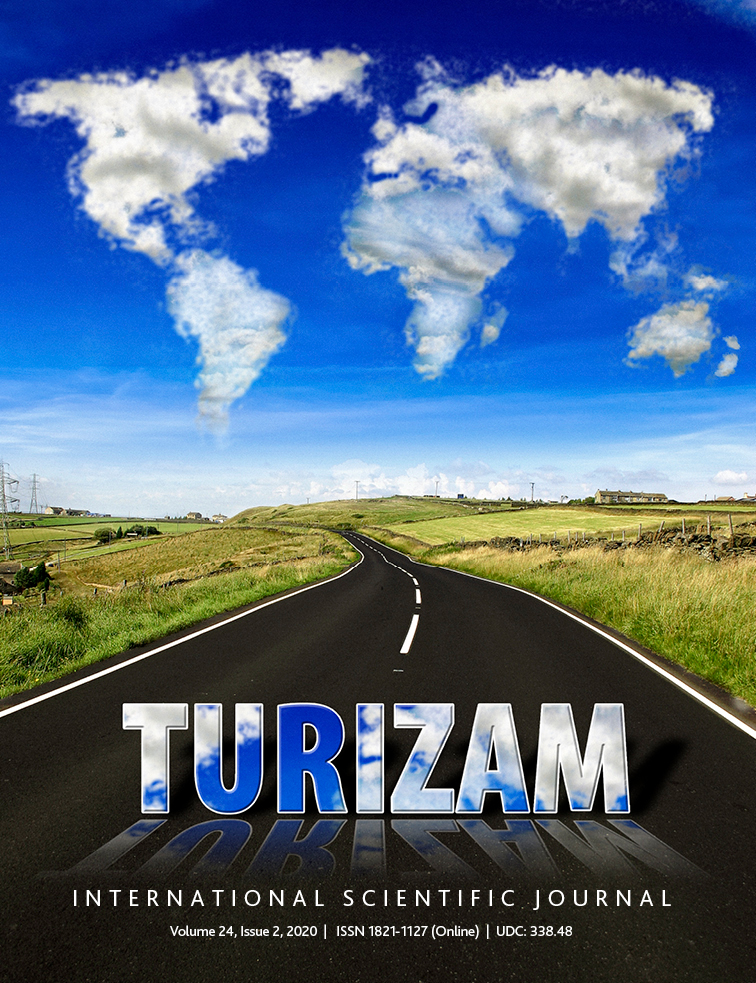The impact of social media in travel decision-making process among the Y and Z generations of music festivals in Vojvodina and Hungary
Abstract
As a remarkable trend, social media is becoming a primary source of information and impressions about tourism destinations. Travellers, especially the young generations are using intensively the information from the web in their decisions and they have widely adopted social media in order to search for advice, share and annotate their experiences. The recent shift towards more visual content can even more strongly affect others' consumption habits, (touristic) decisions, image and opinions on different places and events. Knowing about travelling habits and decision-making processes of young generations can be useful for the tourism service suppliers, because their habits can substantially affect the future tourism development directions.
The aim of this study was to analyze the role and importance of social media usage in travel decision-making among the young participants of music festivals in Vojvodina and Hungary. On the one hand we made a questionnaire survey among the participants of two festivals from the Y and Z generations in the study area (in Green Future of Ada and in the Youth Days of Szeged), and among the students from the University of Szeged, who usually visit festivals. As social media can indirectly contribute to the promotion of festivals and settlements through the public posts of the festivals, on the other hand we analyzed the posts of the selected music festivals on a photo-sharing site (Instagram), searching the hashtags which refer to the places of the festivals.
Based on the results it can be concluded that young people’s travel and festival decisions are considerably influenced by the social media, so the role of online marketing can be significant to reach these generations. Therefore, the shared social media content linked to festivals can make some places better known by shaping their image. With the improved image these posts can contribute to attract more tourists.
Keywords: social media, Y and Z generations, tourists’ decisions, festival tourism, destination image
References
Buhalis, D. – Law, R. 2008. Progress in information technology and tourism management: 20 years on and 10 years after the Internet – The state of eTourism research. Tourism Management. 29(4), 609–623.
Dudás, G. – Boros, L. – Vida, Gy. 2017. Comparing the temporal changes of airfares on online travel agency websites and metasearch engines. Tourism 65(2)., 187-203.
Ethel, L. 2013. Impacts of social media on consumer behavior – Decision Making Process, International Business.
http://www.theseus.fi/bitstream/handle/10024/62367/Lee_Ethel.pdf?sequence=1&isAllowed=y (downloaded: 2019.11.19.)
Eszes, I. 2007. Web 2.0. ESZES könyvtár. http://www.eszes.net/eTanulmanyok/web2.pdf (downloaded: 2019.11.19) (In Hungarian)
Éber, M. Á. 2008. Túl az élménytársadalmon? – avagy az élménytársadalom másfél évtizede. Szociológiai Szemle 18(1), 78-105. (In Hungarian)
Fotis, J. et. al. 2012. Social media use and impact during the holiday travel planning process. In: Fuchs, M. – Ricci, F. – Cantoni, L. (Ed.) Information and Communication Technologies in Tourism, 13-24.
Iványi, T. – Bíró-Szigeti, Sz. 2016. Oszd meg és hashtagelj! – Közönségrészvétel és élménymegosztás a turizmusban. In: Fehér A. – Kiss V. Á. – Soós M. – Szakály Z. (Ed.) Hitelesség és értékorientáció a marketingben. Debreceni Egyetem Gazdaságtudományi Kar, Debrecen, 706–715. (In Hungarian)
Klausz, M. (Ed.) 2017. Megosztok, tehát vagyok: Szakértői kérdések és válaszok a közösségi médiáról. Athenaeum Kiadó, Budapest (In Hungarian)
Kovács, D. 2014. Élmény, élménygazdaság, élménytársadalom és turizmus. Turizmus Bulletin 16(3–4), 40–48. (In Hungarian)
Lévai, R. (Ed.) 2016. Hogyan készíts eredményes Facebook hirdetéseket? RG Stúdió, Pécs (In Hungarian)
Málovics, É. – Prónay, Sz. – Kincsesné, Vajda B. 2015. Az „Erasmus-nemzedék” útra kel – Y generációs egyetemisták külföldi utazási motivációinak és szokásainak feltárása. In.: Marketing & Menedzsment 2015(1), 43-57. (In Hungarian)
MCCRINDLE-Research 2012. Generations Defined. http://mccrindle.com.au/resources/Generations-Defined-Sociologically.pdf (downloaded: 2019.07.05.)
Mester T. 2008. Ifjúsági turizmus Magyarországon – I. rész. Turizmus Bulletin. 12(2), 2-13. (In Hungarian)
Michalkó G. 2014. Városimázs és versenyképesség: a turizmusorientált településmarketing néhány aspektusa. In: Tózsa I. (Ed.): Turizmus és településmarketing. Budapesti Corvinus Egyetem Gazdaságföldrajz és Jövőkutatás Tanszék, Budapest, 37-47. (In Hungarian)
Oklobdžija, S. 2015. The role and importance of social media in promoting music festivals. Synthesis: Marketing and Trade, 583-587.
Pendergast, D. 2010. Getting to Know the Y Generation. In: Benckendorff, P. – Moscardo, G. – Pendergast, D. (Ed.): Tourism and Generation Y. Boston: CAB International.
Segarra, J. P. 2015. The vision of Tourism 3.0.
https://app.box.com/s/uci8ireztqflcxrps3lvcu763bmpt0qz
(downloaded: 2019.11.05.)
Spiegler, P. 2010. Turisztikai tér-képek a Dél-Dunántúlról. In: Görcs N. L. – Pirisi G. (Ed.): Tér – Tálentum – Tanítványok II., Pécs, 125-136. (In Hungarian)
Streit, E. 2014. A fiatal generáció utazási döntéseinek marketingszempontú elemzése. In.: E-CONOM. Online tudományos folyóirat., 66-79. (In Hungarian)
Veres, I. – Danó, Gy. – Iványi, T. 2017. Osszunk vagy ne osszunk? Fiatalok utazási szokásai és élménymegosztás. In: Bányai, E. – Lányi, B. – Törőcsik, M. (Ed.): Tükröződés, társtudományok, trendek, fogyasztás. Pécsi Tudományegyetem, Közgazdaságtudományi Kar, Pécs. 75–84. (In Hungarian)
Zátori, A. 2014. Élményszemlélet a turizmusban. A turisztikai élményteremtés koncepciói.
Turizmus Bulletin. 16(2), 51-60. (In Hungarian)
Xiang, Z. – Gretzel, U. 2010. Role of social media in online travel information search. Tourism Management. 31(2), 179-188.

